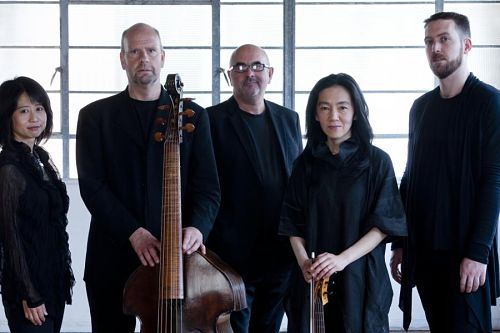Fretwork’s tear-filled Dowland program never cries itself out
In a year dominated by Verdi and Wagner bicentennials, a less obvious composer anniversary is the 450th birthday of Renaissance composer John Dowland.
Fretwork, the British-based early music ensemble that also commissions new music for old forces, cornered the local market on the Dowland celebration by performing an evening of music by Dowland and inspired by him Friday night at Mandel Hall.
This program was the opening event in the University of Chicago Presents’ Howard Mayer Brown Early Music Series. Additionally, because of Benjamin Britten’s fascination with Dowland, the Fretwork performance was presented as the penultimate concert of the series’ fall Britten Festival celebrating that composer’s centennial.
Having been a lutenist himself, that instrument figures prominantly in Dowland’s music, and lutenist Elizabeth Kenny, guest artist for the evening, skillfully led the proceedings from the center of the ensemble.
Most of the evening was devoted to pieces from Dowland’s 1604 instrumental collection Lachrimae for viols and lute, which includes as its centerpiece the elaborate concept piece, “Seven Teares,” or pavans based on Dowland’s most famous song, Flow my tears.
The first part of the program included various selections in groups of three that tended to follow the pattern of an opening piece of moderate tempo followed by an upbeat selection and ending in a slower piece. The last piece of two of the groups were dazzling solo lute pieces that were played by Kenny with extraordinary technique and immense sensitivity and proved the highlight of the evening.
The lute always had the most interesting role even in the ensemble pieces, although various viols would take the lead at various points even if most of the time, their role was more one of accompanying texture and rhythm.
The second half of the program began with Adrian Williams’ 2004 Teares to Dreams, an elegiac piece written for the same forces as Dowland’s Lachrimae but which included spicy dissonances and orchestral effects unknown to Dowland but reflecting his influence.
Williams’ work is not merely a pedantic and nostalgic exercise but makes an effective statement of its own as to points of intersection between 17th- and 21st-century music. Teares to Dreams provided the only opportunity of the evening for Fretwork to fully take the spotlight, which the group did admirably.
The “Seven Teares” portion of Lachrimae closed out the evening. These seven pavans all take the melody of Flow my Tears and subject it to various permutations, which reflect variance of mood and musical elements that are forward-looking by early 17th-century standards. These are not so much variations as transformations, each with their own distinctive character.
Nonetheless, one senses that like most of Lachrimae, this set was intended more to be played than heard. Given the dreary and dirge-like nature of the melody itself, seven statements of it meant that by evening’s end, the tears had flowed so freely for so long that it was a real tribute to the artistry of Kenny and Fretwork that the well of tears had not dried up en route.
Posted in Performances



